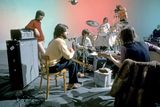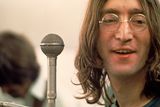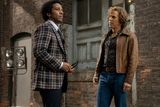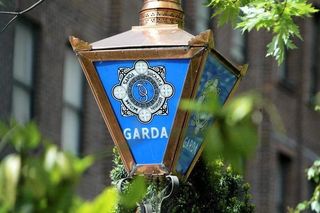The Beatles’ Let It Be film is back and as depressing as ever — even if this time it’s for different reasons
For those attuned to what the Beatles really were, it's awful to watch Apple – set up to enable, in Paul McCartney's words, “Western communism” – squeezing the teabag one more time


It's here at last: Let It Be the motion picture, dead duck of the canon, unavailable for more than half a century, to no one's great dismay. On its original release, this dim and rickety film, which no one liked, was held back for a year, emerging – tired and dirty – eight months after the band's de facto finale, the gleaming Abbey Road. This time it arrives two years after Get Back, Peter Jackson's cleaned-up and computer-enhanced collection of discarded footage, which was more than eight hours long and yet less tedious to watch than this, the original 80-minute movie.
Get Back was the ultimate fans-only trip: hours and hours of nothing but the Beatles, hanging around in dull rooms being themselves, doing nothing. It was like watching reality TV, but with interesting people. And yet somehow it went mainstream, an unlikely entry point for thousands of young and youngish people, buying into an old dream by watching it dissolve.
It's hard to say why this final, feeble incarnation of the Fab Four resonates, all of a sudden. The Let It Be sessions used to be a joke: bleary, beardy Beatles, hungover or heroin-heavy, hating each other, swilling their cheap wine and Scotch and Coke (room temperature, no ice); jamming those rock 'n' roll oldies offhandedly, almost interminably; wading towards their worst LP. Is it just the way that times have changed, people growing more paranoid, scruffy and tired? Is it just that even now, people will like what the Beatles tell them to like? Is it that Paul McCartney's beard looks contemporary again?
Today's News in 90 Seconds - May 8th
Maybe it's just that the open perspective allowed its subject to seem appealing. Outside, the London of January 1969 is all freezing streets and soot-black buildings, but here in the dull barn of Twickenham Studios – lit up like fruit sweets, in vain pursuit of atmosphere – and the windowless basement of the Apple office, we are with the Beatles. Get Back let the moment breathe. Even with their friendship heading for the rocks, these were astonishingly talented men, still close to their peak, who knew and loved each other better than anyone. That will always generate some warmth, provided you leave in the tender little moments that Let It Be leaves out. If those who were there, and those who've read about those who were there, associate the end of the ’60s with a collapse of youthful optimism, younger generations grooved to a glimpse of a looser and less restrictive time, when you could let almost anything hang out, drink whisky at 3pm while smoking indoors, and get paid good money just for making something beautiful. Everyone loved Get Back.
Let It Be, a lowlights package treated as a grim obligation by all concerned at every stage, has never experienced the same kind of love. Beatles fans – for once – reached a consensus years ago. Despite the odd great song, and that performance on the rooftop, Let It Be was visually dingy, horribly depressing and, most unforgivably, dull. For years this reputation, along with the band's bad memories and “bad vibes” (and, of course, the obligatory legal issues) ruled out a re-release, even as Apple – the Beatles' corporation, a utopian experiment turned price-gouging record label – wrung out those last few drops of Beatle juice.
Now, with almost nothing left to sell, Let It Be is placed before us, rather like Mal Evans, the band's loyal dogsbody, setting down a tray of tea and jammy toast. It's hardly cordon bleu, but we're hungry. (Yes, still hungry. Beatlemania remains insatiable.)
Read more
To combat the gloomy look and feel of the original film, Peter Jackson and his team have been recalled. Thankfully, he chooses not to do what he did with Get Back, and torture the footage with image-smoothing, edge-enhancing software until it takes on the creepy unreality of an AI doodle, and can pass as “modern”. Let It Be is grainy and flat, now and then and forever. It still looks like it was filmed in 1969, it just doesn't look – or sound – so ugly any more. This is a relief, at least.
By showing us the bigger picture, Get Back clarified mysteries and corrected myths; Let It Be drags old misconceptions back to the surface. Despite its relentless focus on McCartney, the film does not flatter him. Rather, it suggests that George and John's post-Beatle gripes about his overbearing, schoolmasterly manner were objective truth, the whole of the story. For anti-Paulistas, Let It Be has always been the smoking gun.
Discreetly, it omits George Harrison's temporary flounce (he left the band for several days in the middle of the sessions), but his “argument” with McCartney – scare quotes are appropriate, because anyone who's played in a band will know what an argument really sounds like – would become the film's most notorious moment. Get Back showed us the other side of the story too: Paul, despite his unavoidably aggravating manner, is the only one who's there to work.
Harrison, enduring self-inflicted problems in his marriage, had been staying in Woodstock with The Band, and wanted to bring some of that egalitarian, shambling spirit to his own group, partly just to shake things up, and partly to establish himself as an equal partner. But tight four-piece pop bands don't work like that, and once this becomes abundantly clear, George checks out – then proceeds to sulk like a child, making it stiffly obvious that he'd rather be anywhere other than a Beatles session, the one place left on Earth where being George Harrison does not impress anyone. Meanwhile, Starr and a smacked-out Lennon sit gazing at windmills on the moon.
In Get Back, for the first time ever, we see McCartney's tearful frustration and hear his agonised speech to the troops: he doesn't want to be that guy, he knows he's annoying them, but someone has to keep this whole thing going. Don't they? Let It Be, in Lennon's words, was “set up to make Paul look good”, but it doesn't. It makes him look like your nagging boss, if your nagging boss had a beard like a 19th-century sailor (which nowadays he probably does).
John Lennon during the Let It Be sessions. Photo: Ethan A Russell/Apple Corps Ltd
As time grinds on, and the reissues pile up, the Beatles' cultural worth is not augmented but diminished. That unwavering mass appeal is their most glorious strength, and their Achilles’ heel. Bob Dylan can never be understood as anything other than Bob Dylan, who nobody understands, which is why he's a cult and not a phenomenon. The Beatles, warm and open, can mean different things to different people, according to those people's own emotional requirements. This is nice, and financially convenient, but some of those things clash painfully with the band's intentions, such as they were. So in the ongoing struggle to keep this stuff selling, those intentions – the “point” of the Beatles, if you will – are simultaneously mythologised and pushed to the side. Like many of their ’60s peers, the Beatles wanted to get rich without becoming a commodity. Now that this option no longer exists, that distant dream becomes another way to keep on flogging the product. Try some, buy some. Feel the love! And then come back and buy some more. Then buy it all again, remixed.
The Beatles, by accident but also by design, were an open invitation to think differently – about music, about life, about oneself and other people. Some of those ways of thinking seem ridiculous now, but others still feel desperately relevant. And yet with grim inevitability, this band which took a stand against deference and cultural inertia have been transformed by time and commerce into a new royal family, defused and cosy; icons of cultural stasis and a curdled English exceptionalism. In modern Britain, Paul McCartney is treated as a kind of pot-smoking Paddington Bear. We've drifted disconcertingly far from Why Don't We Do It In The Road? (Although to be fair, if “no one will be watching us”, what would be the point of doing it in the road?)
Once, when we took it on trust that this was the full story, that these sessions weren't just a drag but an emotional inferno, wholly devoid of laughter and friendship, Let It Be was a depressing document. Now we know this wasn't quite the case, it's still depressing – more so for feeling like the latest stop in the Beatles' posthumous descent from avatars of freedom to another expensive form of nostalgia, one more high-end feelgood brand. For those attuned to what the Beatles really were, it's awful to watch Apple – set up to enable, in McCartney's fashionably vague phrase, “Western communism” – squeezing the teabag, constantly confusing the issue of what the Beatles “really” were.
Ah yes, but the music! Even when it's not so good, it's still the greatest thing in the world. Even here and even now, it costs you money, it makes them money, and yet it still means more than money. Soon the Beatles will pass from living memory, and everything they did for the post-war world will seem obscure and irrelevant, having to be explained to children like the jokes in Shakespeare. But the music, with its own irreducible emotional value, will always mean something, and will always hint at something else. Even this fag-end, this crinkly stub. Even this close to the end of their life as a band – and this close to the end of their lives as human beings – the Beatles are something else. Whatever the 21st century makes them, they will continue to be something else.
Yet more Beatles. Still... more Beatles.
Join the Irish Independent WhatsApp channel
Stay up to date with all the latest news

















